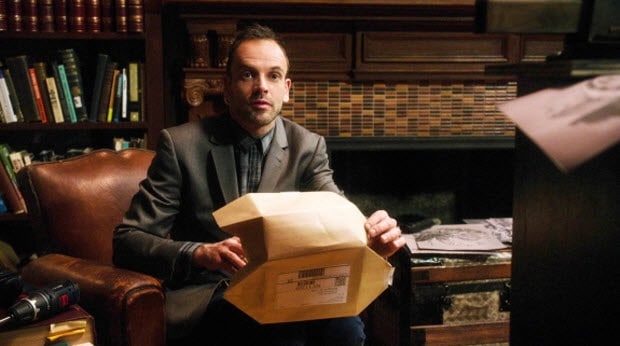
This was a bittersweet episode of Elementary. On one hand, its central mystery is a forced mix of contrivances and predictability; on the other, we see a new side of Sherlock as he takes on a different kind of case.
In “Dead Clade Walking,” there are dinosaurs, junkies, ice cream trucks and museums. A crime scene photo from one of Sherlock’s cold cases has Watson curious about an odd rock that is way out of place. With the help of a geologist, she discovers that it’s actually a dinosaur fossil. Sherlock and Watson soon find themselves dealing with black market smugglers who have a taste for rare artifacts, and a character known as “The Magpie.” Along the way, Sherlock learns of the “Dead Clade Walking” theory, which claims that science hasn’t been too honest about dinosaurs, thanks to an academic conspiracy that would get Dan Brown’s blood pumping – one that ends in murder and money.
Our other half of the episode involves Sherlock and Randy. Sherlock is a sponsor himself now, and Randy is struggling. Randy can’t decide if he should let his ex back into his life, as it was she who got him using in the first place. Sherlock shows genuine care for another person here, and he must do what he can to ensure Randy’s sobriety – he just does it in quirky Sherlock fashion, of course.
Episodes like this one, in any show, frustrate me. It splits into two narratives (as TV does), and one is much stronger than the other. Whenever that happens, you have a clunky final product that leaves viewers feeling lukewarm. The central storyline, the one involving dino bones, is borderline outrageous. Take a step back, and it resembles a plot out of Scooby-Doo. That wouldn’t bother me so much if the plot points weren’t so contrived and convoluted. Every twist is either predictable or forced – precisely what I thought Elementary was good at avoiding. What happened with this one? You’ll know who the killer is right from jump. I can only call such writing lazy, and it was disappointing to see.
But then I get confused when they give us the Randy subplot, because it is a great bit of character drama. How did these two stories get thrown into the mix together? It’s neat to see Sherlock on the other side of the drug-fence now as a sponsor, in a role of responsible supporter. It’s a position of maturity that we don’t much see in Sherlock, but he rises to the occasion here. We met Sherlock as a cold-hearted and brash eccentric, seemingly incapable of genuine care for others. We’ve progressed enough in the series now to the point of seeing Sherlock go out of his way for Randy. It’s clear to us that Sherlock WANTS to help, and he goes about defending Randy’s sobriety in the same way he does when solving crimes: using both logic and divergent thinking. He tackles the problem just as fiercely, too. What makes the Randy subplot so effective though is that Sherlock must learn that not all problems are logic puzzles. In this case, heart counts more – what some might say is Sherlock’s weakness. Watching Sherlock fight with this fact is what good drama is all about.
The best television drama happens when we mix compelling action and plot with good character development. Both have to be present; you can’t rest on one or the other. When you do, you get an episode like “Dead Clade Walking.” It wasn’t awful. It just wasn’t a very memorable episode of Elementary. Meh.
[Photo via CBS ©2014 CBS Broadcasting, Inc. All Rights Reserved]
 Follow Us
Follow Us

